1. Overview
Fumio Kishida, a Japanese politician, served as the Prime Minister of Japan and President of the Liberal Democratic Party (LDP) from October 2021 to October 2024. His premiership was characterized by efforts to revitalize the Japanese economy through a "new model of capitalism" and a significant shift in Japan's defense posture amid rising geopolitical tensions. Despite initiating policies aimed at redistributing wealth and addressing societal challenges like the declining birthrate, his administration faced a series of controversies and public distrust, particularly concerning links to the Unification Church and a widespread slush fund scandal within the LDP. His tenure concluded as he chose not to seek re-election as LDP party leader, leading to his resignation.
2. Early Life and Education
Fumio Kishida's formative years were shaped by his politically active family, his experiences living abroad, and his academic pursuits, all of which influenced his later career.
2.1. Childhood and Background
Fumio Kishida was born on July 29, 1957, in Shibuya, Tokyo, into a prominent political family with deep roots in Hiroshima. His father, Fumitake Kishida, served as a member of the House of Representatives and as director of the Small and Medium Enterprise Agency. His grandfather, Masaki Kishida, also held a seat in the House of Representatives. Former Minister of Economy, Trade and Industry Yoichi Miyazawa is his cousin, and former Prime Minister Kiichi Miyazawa is a distant relative, highlighting a strong lineage of political influence.
The Kishida family, originally from Hiroshima, made annual summer trips back to their hometown. This connection was particularly significant as many of his family members perished in the atomic bombings of Hiroshima and Nagasaki, and Kishida grew up listening to the harrowing accounts of atomic bomb survivors. These early experiences deeply impacted his views on peace and nuclear non-proliferation.
Due to his father's diplomatic posting, Kishida spent part of his childhood in the United States, attending P.S. 020 John Bowne elementary school in Flushing and P.S. 013 Clement C. Moore elementary school in Elmhurst, New York. His experience as a minority in the U.S. and encountering discrimination during his elementary school years profoundly shaped his desire to enter politics, serving as a fundamental motivation to advocate for social justice and understanding. Upon returning to Japan, he continued his education at Kōjimachi Elementary School and Kōjimachi Junior High School. He later graduated from Kaisei Academy, where he was an active member of the baseball team. He once played against Yoshihiko Takahashi, who later became a professional baseball player for the Hiroshima Toyo Carp.
2.2. Education and Early Professional Life
Despite multiple rejections from the University of Tokyo, Kishida pursued his academic ambitions at Waseda University, graduating with a Bachelor of Laws degree in 1982. During his time at Waseda, he befriended Takeshi Iwaya, who would also go on to become a notable politician.
After completing his university education, Kishida began his professional career in finance, working at the now-defunct Long-Term Credit Bank of Japan. He spent two and a half years in foreign exchange at the head office, followed by two and a half years as a sales representative in Takamatsu, specializing in the shipping industry. His time in Takamatsu exposed him to the harsh realities of the economy, witnessing bankruptcies and abscondences, which provided him with valuable insights into the struggles faced by businesses and individuals.
In March 1987, driven by a growing desire to enter politics, Kishida left the bank. He transitioned into public service by becoming a secretary to his father, Fumitake Kishida, who was then a member of the House of Representatives. This period allowed him to learn the intricacies of political life firsthand, assisting his father in intense election campaigns and understanding the dedication required to connect with constituents. This experience laid the groundwork for his own political career.
3. Early Political Career
Fumio Kishida's political career began in the early 1990s, where he steadily climbed the ranks, holding various ministerial and party leadership positions before ultimately becoming Prime Minister.
3.1. Entry into Politics
After serving as his father's secretary, Kishida was elected to the House of Representatives in the 1993 Japanese general election, representing the Hiroshima 1st district. He was a member of the Liberal Democratic Party (LDP) from the outset, joining the Kōchikai faction, the same as his father.
In November 2000, during the "Kato's Rebellion" incident, a political upheaval led by then-Kōchikai Chairman Koichi Kato and Taku Yamasaki of the Kinmirai Seiji Kenkyūkai faction, Kishida initially supported Kato. He signed a petition and was absent during the vote on a no-confidence motion against Prime Minister Yoshirō Mori, whose popularity was declining due to gaffes. However, after the rebellion failed, Kishida joined the anti-Kato Horiuchi faction (Shinseizai Kenkyūkai). In 1997, he was appointed Director of the LDP's Youth Division, a position often seen as a stepping stone for young politicians.
3.2. Ministerial Positions
Kishida served in various cabinet roles before becoming Prime Minister, gaining extensive experience in both domestic and foreign policy.
In 2001, he was appointed Vice Minister of Education, Culture, Sports, Science and Technology in the First Koizumi Cabinet. He made his first entry into the cabinet in 2007, serving as Minister of State for Special Missions under Shinzo Abe's first reshuffled cabinet, responsible for Okinawa and Northern Territories affairs, national life, re-challenge initiatives, science and technology policy, and regulatory reform. He continued in similar roles under the subsequent Yasuo Fukuda Cabinet, also taking on responsibilities for consumer affairs and food safety, and space development in 2008.
From 2007 to 2008, he specifically served as Minister of Okinawa Affairs in both the Abe and Fukuda cabinets. His background in Okinawa affairs was considered beneficial for addressing issues like the Futenma Air Station relocation.
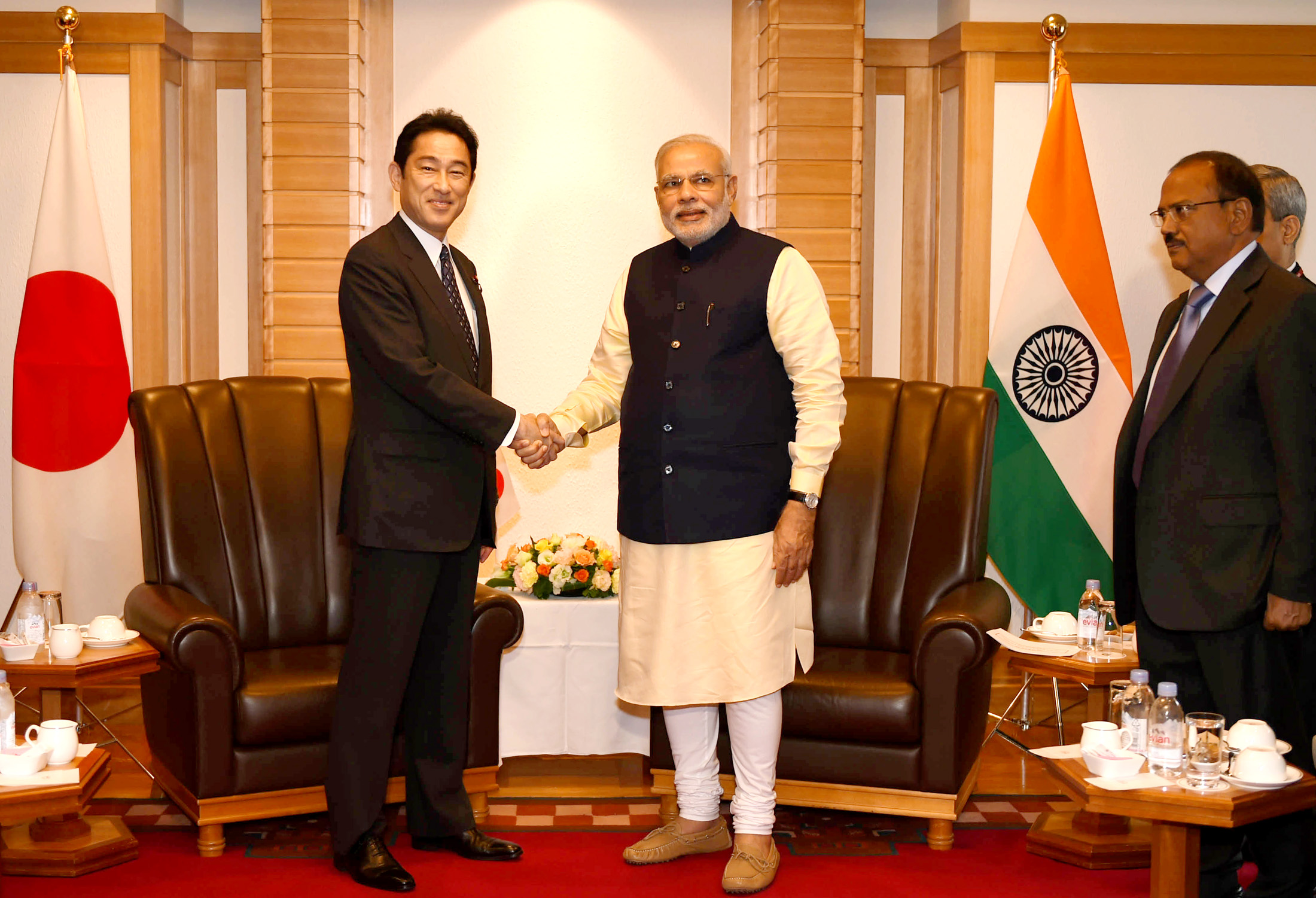
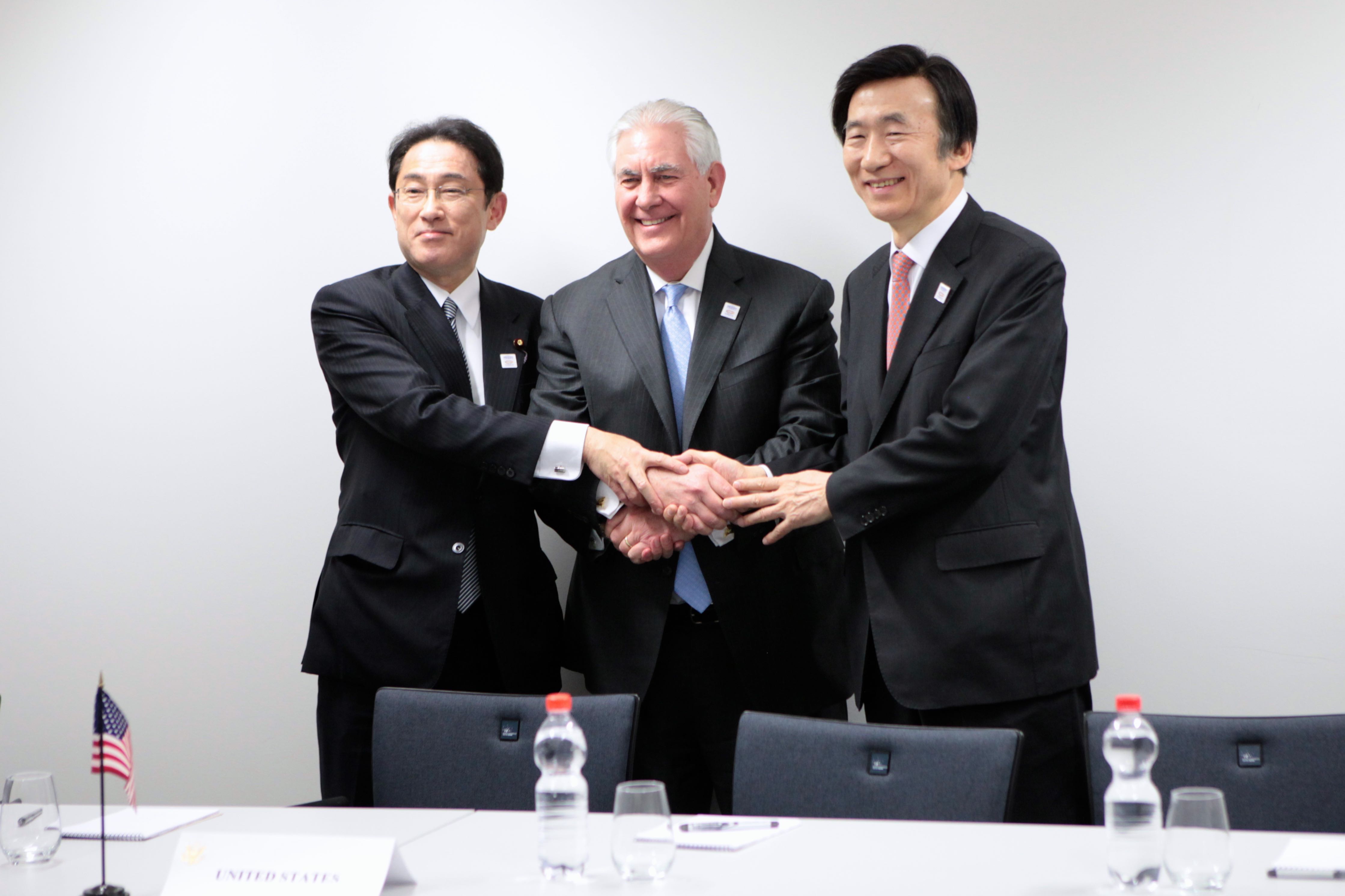
Kishida's most prominent pre-premiership role was as Minister for Foreign Affairs from 2012 to 2017 in Shinzo Abe's cabinet. He became the longest-serving foreign minister in post-war Japanese history, surpassing even Abe's father, Shintaro Abe. In this role, he played a crucial part in arranging then-U.S. President Barack Obama's historic visit to Hiroshima in May 2016, where he personally explained the atomic bombing sites in English without an interpreter. He also gained media attention in 2017 when he appeared alongside comedian Piko Taro to promote a United Nations program. On December 28, 2015, Kishida reached a landmark agreement with then-South Korean Foreign Minister Yun Byung-se to "finally and irreversibly" resolve the comfort women issue, with Japan contributing 1.00 B JPY to a fund for former comfort women.
After Tomomi Inada resigned from the position due to a scandal related to daily reports from Japanese Self-Defense Forces in South Sudan, Kishida briefly served as acting Minister of Defense from July 28 to August 3, 2017, simultaneously holding both the foreign and defense portfolios, a first in Japanese constitutional history.
3.3. Party Leadership Roles
Kishida held significant positions within the LDP, which positioned him as a potential future leader.
In October 2012, following the retirement of faction leader Makoto Koga, Kishida assumed leadership of the LDP's more moderate Kōchikai faction. He remained its leader until his resignation in 2023. This role provided him with a strong power base within the party.
From 2017 to 2020, he chaired the LDP Policy Research Council, a key party post traditionally seen as a stepping stone to the party leadership. This role allowed him to gain extensive experience in party affairs and policy formulation. In 2018, he considered running in the 2018 Liberal Democratic Party (Japan) leadership election, but was persuaded by Prime Minister Abe not to, with an implicit promise of future support for his succession. However, by mid-2020, support from key LDP lawmakers had shifted away from Kishida, with Chief Cabinet Secretary Yoshihide Suga gaining momentum.
Despite this, Kishida ran in the 2020 Liberal Democratic Party (Japan) presidential election but lost to Yoshihide Suga. After his defeat, he was not offered a position in the Suga cabinet, although his faction did secure two cabinet seats. This period marked a temporary setback in his path to the premiership.
4. Premiership (2021-2024)
Fumio Kishida's tenure as Prime Minister, from 2021 to 2024, was marked by ambitious domestic policies, a proactive foreign policy strategy, and several significant challenges and controversies.
4.1. Appointment and First Cabinet
Following Yoshihide Suga's announcement on September 3, 2021, that he would resign due to low approval ratings and a new wave of COVID-19 infections, the LDP held another leadership election. On September 29, 2021, Kishida emerged victorious, defeating Taro Kono in a runoff vote to become the new leader of the ruling Liberal Democratic Party. He secured a total of 257 votes (60.19%), from 249 parliamentary members and eight rank-and-file members, paving his way to the premiership.
Kishida was confirmed as Prime Minister by the National Diet four days later, on October 4, 2021. He formed the First Kishida Cabinet, which comprised 21 members, including 13 new appointees, while retaining veteran ministers like Toshimitsu Motegi and Nobuo Kishi. He became the first LDP prime minister from the Kōchikai faction in nearly three decades, since Kiichi Miyazawa resigned in 1993. On the same day, Kishida announced a snap 2021 Japanese general election for October 31, 2021. His first speech as prime minister on October 8, 2021, vowed to combat the COVID-19 pandemic in Japan and address perceived threats from China and North Korea.

Following the 2021 general election, the LDP lost 25 seats but still managed to maintain a majority, solidifying Kishida's position as Prime Minister. He subsequently formed the Second Kishida Cabinet, replacing Toshimitsu Motegi with Yoshimasa Hayashi as Foreign Minister, while Motegi became the party's Secretary-General.
4.2. Domestic Policy
The Kishida administration implemented several major domestic initiatives and reforms across various sectors.
4.2.1. Economy and Fiscal Policy
Kishida's core economic philosophy was articulated as a "new model of capitalism," aiming to reverse decades of neoliberal policies and address income disparity. His tenure saw a notable shift in economic trends, with Japan experiencing its highest wage growth in 30 years, largely driven by record wage increases achieved through annual negotiations. He emphasized that the benefits of growth should extend to all stakeholders, not just a limited group.
In a significant fiscal decision, Kishida instructed his government in December 2022 to increase "national security-related spending" to 2% of Japan's GDP by 2027. This translates to a defense budget increase from 5.40 T JPY ($40 billion) in 2022 to 8.90 T JPY ($66 billion) by 2027, a 65% rise. The total spending on defense between 2023 and 2027 was projected to be around 43.00 T JPY ($321 billion), a 56% increase from the 2019-2023 period.
Amidst the relaxation of COVID-19 measures in spring 2022, Kishida resumed the admission of foreign workers into Japan, but refrained from a comprehensive reform of the nation's immigration policy. His government's target of a minimum wage of 1.50 K JPY by the mid-2030s was met with skepticism by economists, who questioned its feasibility given certain macroeconomic factors.
In April 2023, Kishida appointed Kazuo Ueda as Governor of the Bank of Japan. Ueda indicated plans to continue the ultra-easy monetary policy initiated by his predecessor, Haruhiko Kuroda. However, the International Monetary Fund (IMF) predicted in 2023 that Germany would surpass Japan as the world's third-largest economy.
4.2.2. Childcare and Social Welfare
Recognizing Japan's declining birthrate as a critical issue, Kishida prioritized childcare as a central policy for 2023. He highlighted the potential consequences of child poverty and affirmed his administration's commitment to increasing monetary child benefits for parents. His administration announced a plan to double the country's children-related budget by June 2023, and by June 1, the Japanese government allocated 3.50 T JPY annually for childcare.
A significant institutional change was the establishment of the Children and Families Agency on April 1, 2023. This new administrative body within the Cabinet Office was created to consolidate and address various issues related to child welfare, including nursery access, child allowances, combating child poverty, preventing child abuse and suicide, addressing cyberbullying, and providing support for children with disabilities, all of which were previously handled by disparate government agencies.
By 2022, Japan's child poverty rate had declined to 11.5%, and UNICEF ranked Japan eighth among 39 developed countries in tackling child poverty in 2023. However, media responses to Kishida's childcare policies were mixed; some critics, such as The Guardian's Justin McCurry, argued that they had not been effective in significantly raising Japan's birth rate.
4.2.3. COVID-19 Response
The Kishida administration navigated various phases of the COVID-19 pandemic, adapting policies to evolving circumstances.
Japan confirmed its first case of the SARS-CoV-2 Omicron variant between November 30, 2021, and May 7, 2023. Early Omicron cases were primarily imported until domestic transmission began to develop. In December 2021, as the Omicron variant spread globally, Prime Minister Kishida announced tightened travel restrictions for international travelers. By January 2022, he urged Japanese citizens to get vaccinated with booster shots, though new states of emergency or restrictions were deemed unlikely to combat the record surge.
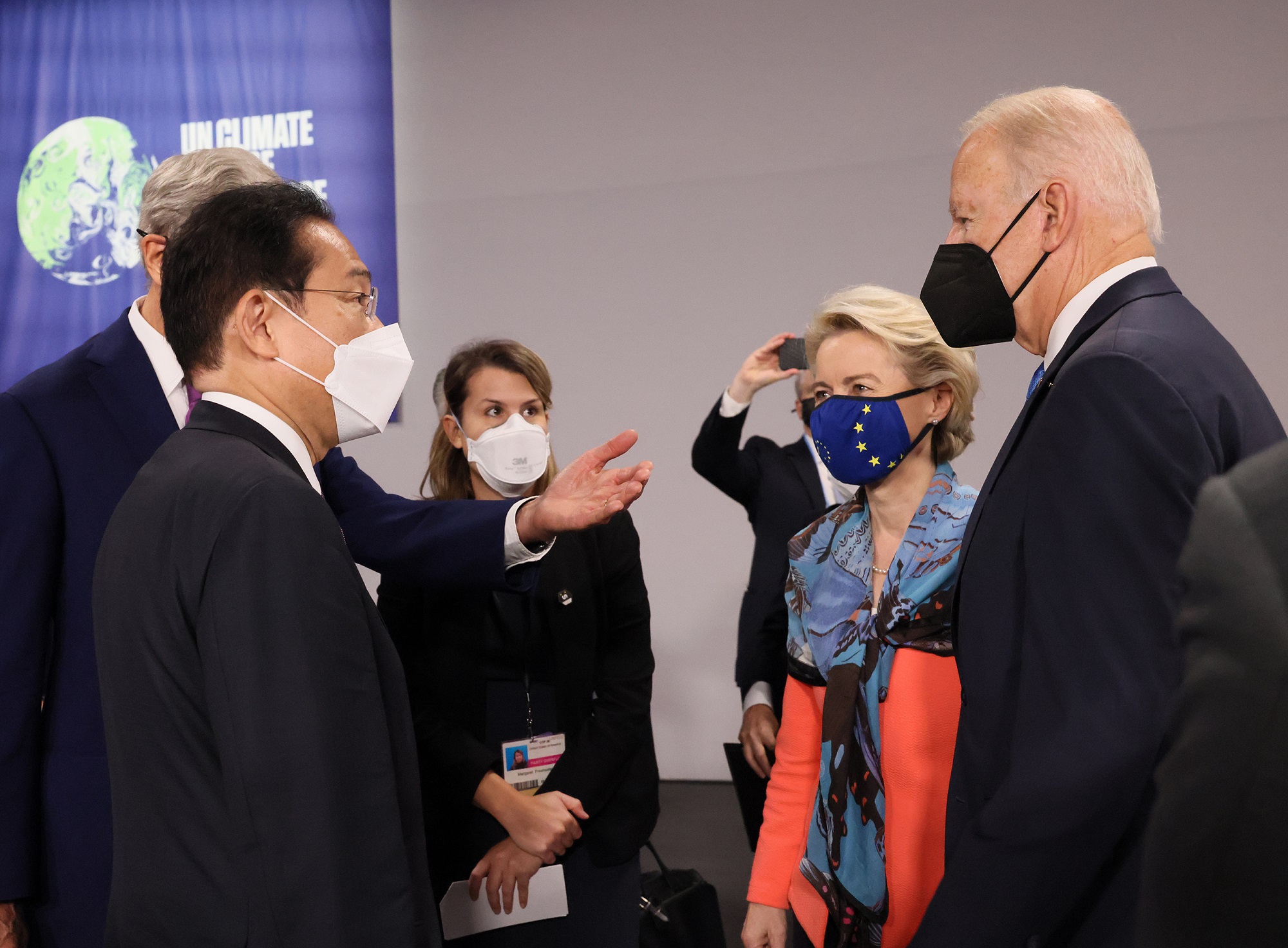
In August 2022, during the second Omicron surge, Prime Minister Fumio Kishida tested positive for COVID-19, experiencing "very mild" symptoms. He continued to perform his official duties remotely via telework from the Prime Minister's official residence, emphasizing his commitment to avoiding delays in national politics. He returned to face-to-face duties after completing his recuperation period on August 31.
In September 2022, Kishida announced that visa requirements for tourists from certain countries would be waived starting October 11, marking a significant step towards reopening international travel after years of pandemic-induced border restrictions.
By January 2023, amid a decline in Omicron infections, Kishida announced the government's pledge to downgrade the legal status of COVID-19 to a Class 5 disease, the same level as seasonal influenza. This decision heralded a major shift in public health policy. Subsequently, on March 13, his government ended the request for citizens to wear face masks in public, a policy that had been in place for approximately three years. On April 27, Katsunobu Katō, Kishida's Health Minister, confirmed that COVID-19 would be reclassified on May 8. Kato stated that the Omicron variant and its subvariants caused less severe disease and fewer deaths than previous strains, indicating no need to worry about increased public health risks. Daily announcements of COVID-19 cases officially ended, with reports simplified to weekly updates from designated medical institutions.
Despite these changes, the media's response to Kishida's COVID-19 policies was mixed. The Mainichi Shimbun warned that the downgrade could lead to a "collapse" of Okinawa's medical system during a surge in June 2023, highlighting ongoing concerns about regional healthcare capacity.
4.2.4. Fukushima Treated Water Discharge
The decision to discharge treated water from the Fukushima Daiichi Nuclear Power Plant was a significant and contentious issue during Kishida's premiership. The plan, initially announced by his predecessor Yoshihide Suga in April 2021, involved the Tokyo Electric Power Company (TEPCO) gradually releasing stored and treated water into the ocean over 30 years.
Kishida's government reaffirmed its commitment to this plan, with the discharge beginning in August 2023. Prior to implementation, the government secured an agreement with the International Atomic Energy Agency (IAEA) regarding the levels of tritium in the treated water. In July 2023, Rafael Grossi, the IAEA's Secretary-General, provided a comprehensive report affirming the safety of the operation, further stating in August that tritium levels were significantly below IAEA safety standards and that the water was not toxic. The Ministry of Environment also confirmed adherence to IAEA standards and that tritium levels would remain below dilution regulations. TEPCO commenced the discharge on August 24, 2023, without reported errors.
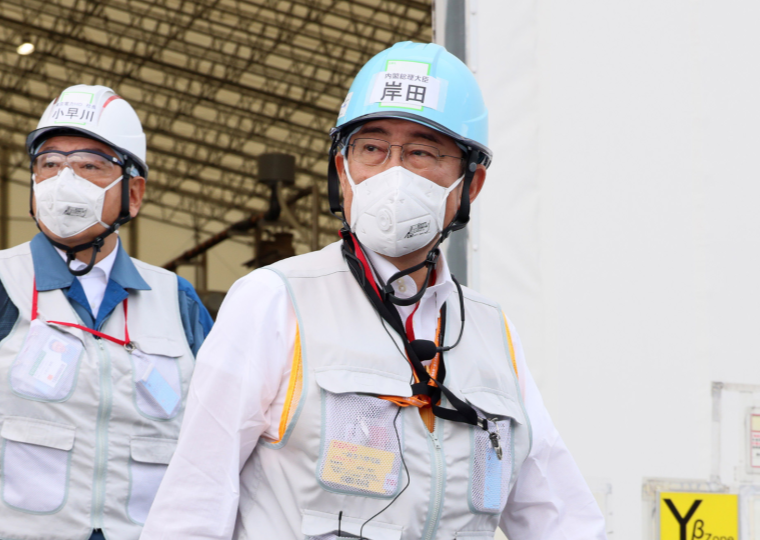
The announcement and implementation of the water release elicited varied reactions both domestically and internationally. While some domestic organizations, such as the National Federation of Fisheries Cooperative Associations, opposed the plan, the most forceful foreign backlash came from China, which imposed an outright ban on all Japanese fish products, Japan's largest seafood export market. China faced criticism for this ban, with accusations of hypocrisy and disinformation, as its own nuclear waste water had previously contained significantly higher levels of tritium.
In the days following the release, Japan experienced a surge in harassing phone calls from Chinese speakers targeting individuals, companies, and government agencies. Kishida condemned these calls as "deplorable" and urged China to stop them. The Foreign Ministry issued a travel advisory for Japanese citizens in China, citing escalating harassment and protests. Sanae Takaichi, the Minister of State for Economic Security, indicated that Japan might file a World Trade Organization (WTO) complaint. In contrast, the United States affirmed its support for the water release, with Ambassador Rahm Emanuel publicly eating seafood in Fukushima to demonstrate its safety. South Korea's government did not oppose the plan, and President Yoon Suk Yeol also publicly consumed Fukushima seafood to allay public fears, despite protests in South Korea.
Throughout the initial stages of the release, the Environment Ministry conducted tests on tritium levels in both the water and fish, consistently reporting low levels. Recognizing the severe impact on fish markets, Kishida promised financial support to local fisheries. On August 30, 2023, Kishida and three cabinet ministers publicly ate Fukushima fish sashimi, declaring it "safe and delicious" in an effort to dispel contamination fears.
4.3. Foreign Policy and Defense
Fumio Kishida's foreign policy during his premiership was marked by a commitment to strengthening alliances, engaging with key international partners, and taking a firm stance on regional security issues.
4.3.1. Overall Diplomatic Stance
Kishida's overarching philosophy in foreign relations was termed "humane diplomacy," emphasizing Japan's commitment to peace and human rights. Guided by the Peace Constitution and the Japan-U.S. alliance, he sought to strengthen bilateral ties with the United States and promote the "Free and Open Indo-Pacific" (FOIP) strategy. This strategy aimed to counterbalance China's growing political assertiveness and military presence in the region. Kishida publicly stated that the Taiwan Strait could be the "next major diplomatic problem" following China's crackdown on Hong Kong, advocating for greater cooperation with Taiwan. He also condemned China's actions regarding the Senkaku Islands dispute and the persecution of Uyghurs in China.
Kishida's foreign policy was pragmatic, reflecting Japan's position in a complex geopolitical landscape. In October 2023, he condemned Hamas' actions during the 2023 Israel-Hamas war and expressed support for Israel's right to self-defense. In April 2024, he also strongly condemned the April 2024 Iranian strikes against Israel. He also supported Bangladesh's efforts to repatriate Rohingya refugees to Myanmar.
4.3.2. Major International Alliances
Under Kishida, Japan significantly deepened its engagement with key international partners and multilateral frameworks. He actively pursued strengthening the Quadrilateral Security Dialogue (Quad) with Australia, India, and the United States, making visits to India and Australia to maintain regional stability. Japan also increased its cooperation with NATO, with Kishida attending both the 2022 and 2023 NATO summits, highlighting Japan's growing role in global security.
A cornerstone of his foreign policy was the reinforced alliance with the United States. In January 2023, he embarked on a tour of G7 nations, meeting with leaders to discuss collective security and economic cooperation. Japan hosted the 49th G7 summit in his hometown of Hiroshima Prefecture in May 2023. As the host leader, Kishida invited leaders from the "Global South", including Vietnamese Prime Minister Phạm Minh Chính and Indian Prime Minister Narendra Modi, as well as Ukrainian President Volodymyr Zelenskyy. The G7 leaders paid respects at the Hiroshima Peace Memorial Park and Museum, and issued a joint statement affirming support for Ukraine and the rule of law, concluding what Kishida considered a successful summit.
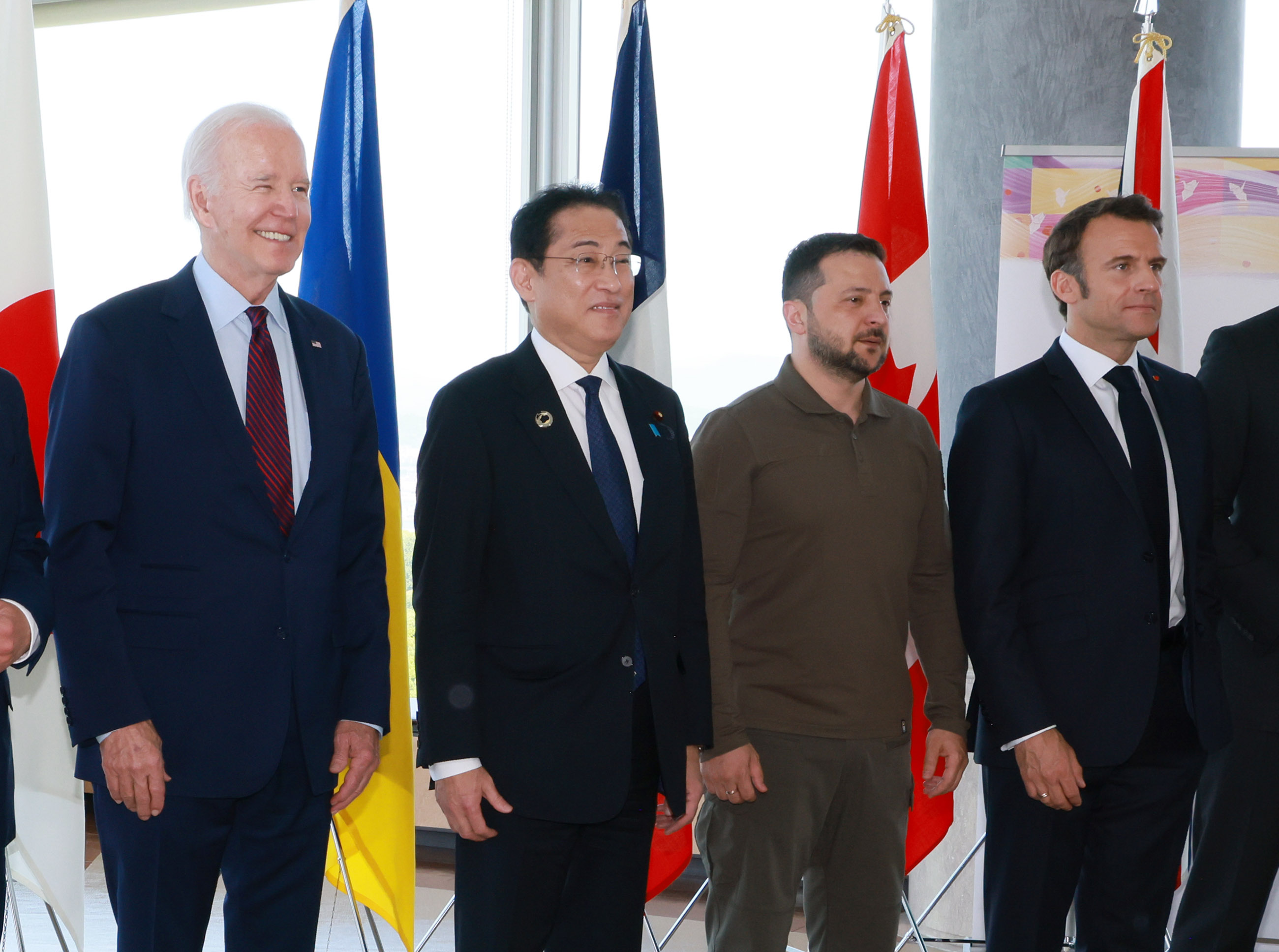
4.3.3. Bilateral Relations
Kishida's administration actively pursued diplomatic interactions and agreements with specific countries and regions to enhance Japan's strategic and economic interests.
4.3.4. Response to the Russian Invasion of Ukraine
Japan, under Kishida's leadership, took a firm and decisive stance in response to the Russian invasion of Ukraine. On February 24, 2022, Kishida joined other G7 leaders in imposing economic sanctions on Russia, which were significantly harsher than the largely symbolic measures implemented by the Shinzo Abe government following Russia's 2014 annexation of Crimea. This stronger response was partly driven by concerns within the LDP that a weak stance would undermine European support for Japan in the event of a potential Chinese attack on Taiwan. In March 2022, Japan also announced it would accept Ukrainian refugees.
In December 2022, the Kishida government announced a substantial increase of 320.00 B USD in military spending, partly influenced by the ongoing conflict in Ukraine. On January 14, 2023, former Russian President Dmitry Medvedev provocatively called for Kishida to commit "seppuku" after Japan and the U.S. warned Russia against using nuclear weapons in Ukraine.
In February 2023, Kishida pledged approximately 5.50 B USD in aid to Ukraine. He invited Ukrainian President Volodymyr Zelenskyy to a virtual G7 leaders' meeting on February 24, 2023, the first anniversary of the invasion, where the G7 announced "new coordinated economic actions" to support Ukraine. Kishida became the last G7 leader to visit Kyiv during the invasion, doing so on March 21, 2023. He met with President Zelenskyy and also visited Bucha, the site of a civilian massacre, stating he was "outraged by the cruelty." His visit garnered praise internationally. In May 2023, Japan announced it would provide 100 military vehicles to the Ukrainian military. Kishida also led G7 leaders in announcing a joint declaration of support for Ukraine during the 2023 Vilnius NATO summit.
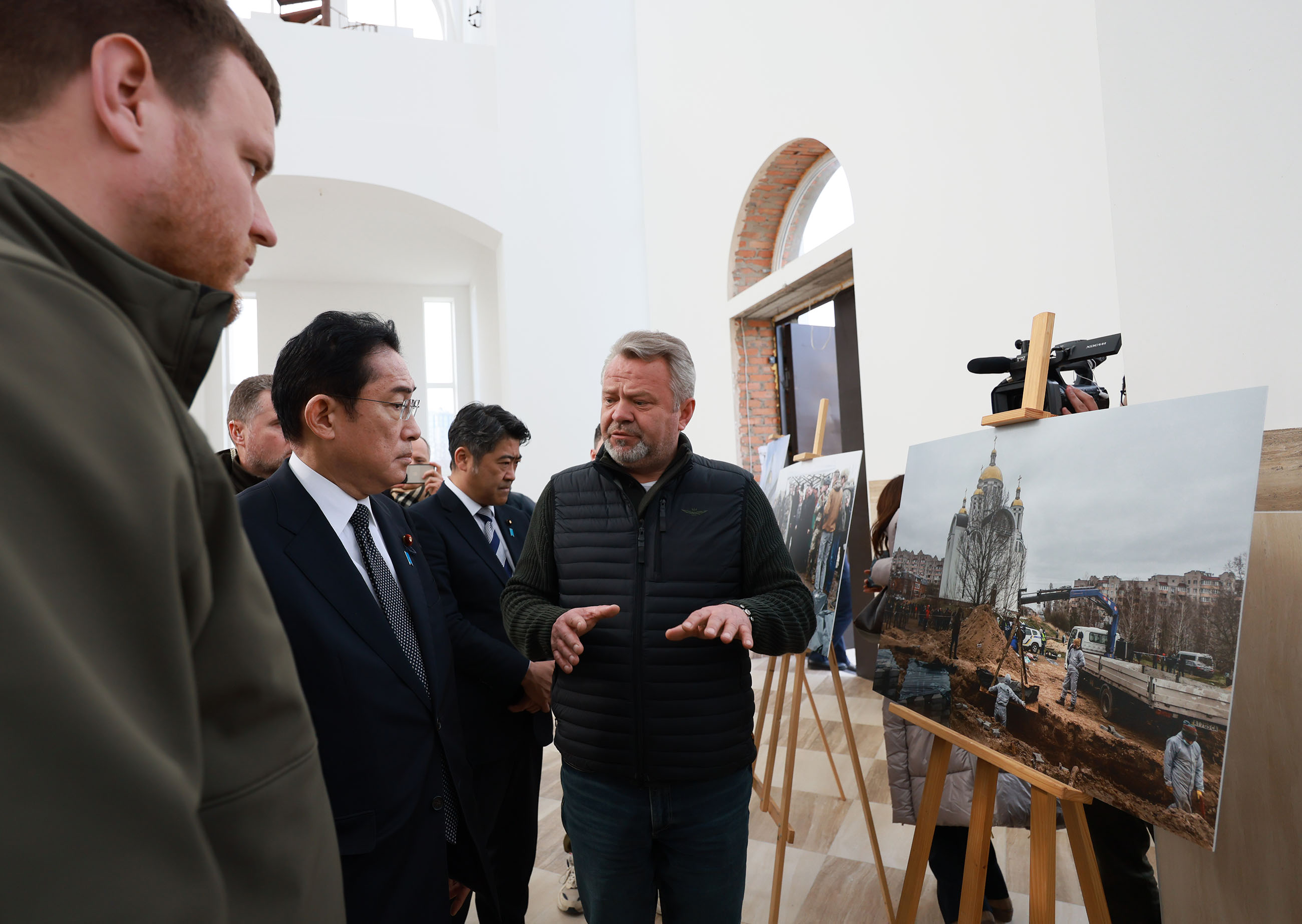
4.3.5. Defense Policy Shifts
Under Fumio Kishida, Japan saw significant shifts in its defense policy, moving towards a more robust and assertive security posture. Initially perceived as dovish and lukewarm on constitutional revision, Kishida's stance evolved. His administration emphasized "humane diplomacy" grounded in Japan's pacifist constitution, the Japan-U.S. alliance, and the Japan Self-Defense Forces.
In May 2022, Kishida pledged to increase Japan's military spending to meet the NATO target of 2% of GDP. This commitment was formalized in the December 2022 National Security Strategy, which constituted an "epic shift in Japan's defense posture," as noted by National Security Advisor Takeo Akiba. The strategy included raising the defense budget by 65% by 2027, from 1.2% to 2% of GDP in 2022.
Kishida's cabinet began "loosening traditional military constraints and beefing up its defense capabilities." In July 2024, a U.S.-Japan joint operational command was announced to facilitate seamless military operations. His administration also approved overseas arms sales and revised equipment and technology transfer rules, allowing weapons to be sold to countries beyond traditional partners. In July 2024, Kishida further stated his intention to strengthen coordination with NATO, including joint Euro-Atlantic exercises. In August 2024, he urged LDP officials to advance discussions on constitutional reform, emphasizing the crucial role of the JSDF for the state.
5. Major Incidents and Controversies
Fumio Kishida's premiership was marked by several significant challenges, crises, and public controversies that affected his administration's standing and public trust.
5.1. Assassination Attempt
On April 15, 2023, while delivering a campaign speech in Wakayama, Kishida was targeted in an assassination attempt. A 24-year-old man, Ryuji Kimura, threw a cylindrical explosive device, which detonated after a brief delay. Kishida was swiftly evacuated from the scene unharmed, while Kimura was apprehended with what appeared to be a second explosive. The incident, occurring during an election campaign, prompted Kishida to declare that "elections are a bedrock of democracy," vowing that such violence would not impede democratic processes. Kimura was indicted for attempted murder in September 2023 and sentenced to ten years' imprisonment in February 2025.
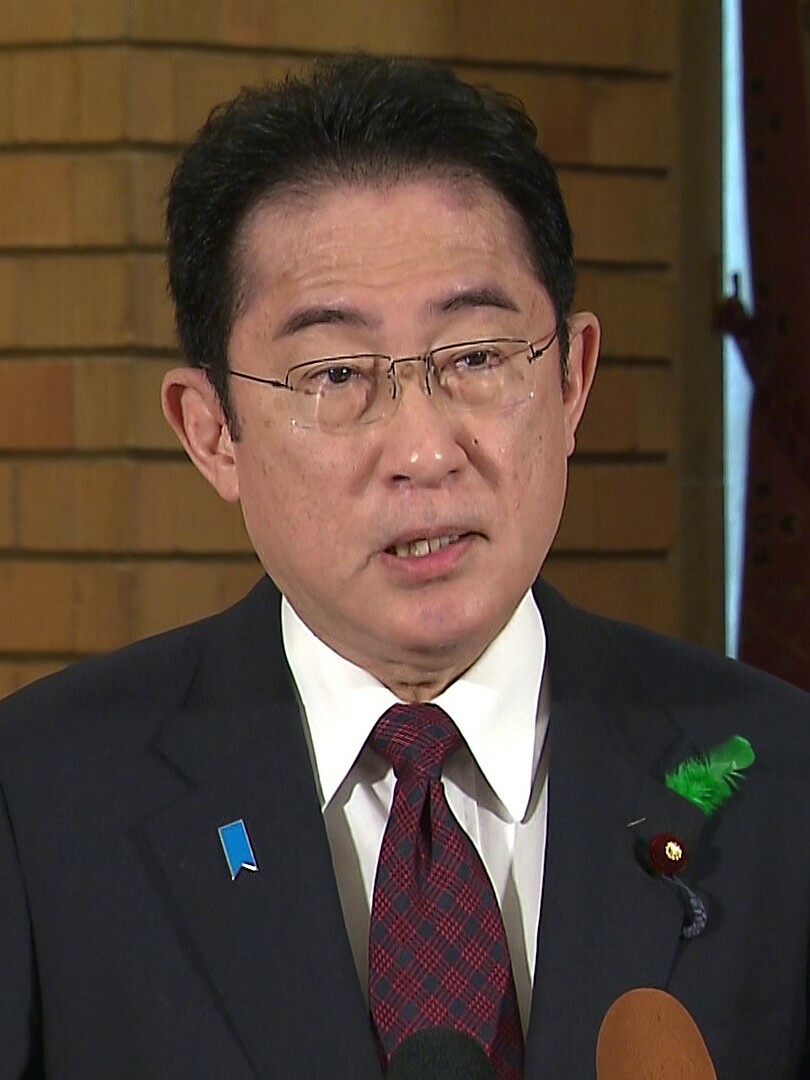
5.2. LDP Slush Fund Scandal
In December 2023, a widespread corruption scandal, known as the "LDP slush fund scandal," erupted within the Liberal Democratic Party. It involved undeclared funds from political fundraising parties, particularly implicating ministers and senior leaders from the Abe faction, such as Yasutoshi Nishimura and Kōichi Hagiuda. It was believed that the Abe faction had concealed over 500.00 M JPY (approximately 3.30 M USD) in funds over five years.
In response, Kishida swiftly reshuffled his cabinet, dismissing several ministers, including Nishimura and Hirokazu Matsuno, who were associated with the scandal. Other Abe faction members also resigned from their parliamentary posts. Kishida publicly pledged to "work like a ball of fire" to restore public trust. He also announced his resignation as the head of his own Kōchikai faction and stated he would leave the faction while serving as premier, a move that became customary for LDP leaders after the scandal. The Kōchikai faction subsequently dissolved in January 2024. The Abe faction also followed suit and disbanded. However, two other major LDP factions, Shikōkai (led by Tarō Asō) and Heisei Kenkyūkai (led by Toshimitsu Motegi), defied Kishida's call for dissolution, opting instead to transform into "policy groups."
Further scrutiny revealed that Kishida's own Kōchikai faction had failed to declare 30.00 M JPY in fundraising over a three-year period, which Kishida attributed to "clerical errors." Although not expected to face prosecution, the scandal significantly eroded public confidence in his government. Polls in February 2024 showed his cabinet's approval rating as low as 14-25%, a record low comparable to Tarō Asō's approval before the 2009 general election. The LDP lost all three seats in the April 2024 by-elections, previously held by LDP members or affiliated independents. Despite calls to step down, Kishida denied he would resign immediately.
The scandal also brought renewed attention to ties between some LDP members and the Unification Church, with Education Minister Masahito Moriyama facing scrutiny for his alleged links, which Kishida refused to act upon.

5.3. Ties to Unification Church
Following the assassination of Shinzo Abe in July 2022, the alleged links between the Liberal Democratic Party and the Unification Church, a Korean cult accused of scamming Japanese followers out of their wealth, became a major public controversy. While no direct ties between Kishida himself and the church were immediately evident, the widespread connections among LDP members, including Abe, significantly impacted public trust in his administration.
In response to media reports, Kishida reshuffled his cabinet on August 10, 2022, removing several members affiliated with the Unification Church, including Abe's brother, Nobuo Kishi, from his role as Minister of Defense. However, further reports emerged, including one in Shūkan Bunshun on September 1, which claimed that Mineo Nakayama, the president of a Kumamoto-based support group for Kishida's premiership bid, was also a chairman of a Unification Church-affiliated group advocating for a Japan-Korea Undersea Tunnel. Both Kishida and Nakayama denied knowledge of the tunnel advocacy group's connection to the Unification Church.
In December 2023, Kishida faced renewed scrutiny over a meeting in October 2019, reportedly arranged by Shinzo Abe, with Newt Gingrich, the former U.S. House Speaker, and Masayoshi Kajikuri, chairman of numerous Unification Church-affiliated organizations. Kishida denied knowledge of Kajikuri's presence at the meeting, stating he was only aware of meeting Gingrich and "a large number of accompanying persons." This further fueled public suspicion, especially since Kajikuri was known to have invited Abe to a 2021 online conference by the Universal Peace Federation (a church front), an appearance cited by Tetsuya Yamagami as a major factor in his decision to assassinate Abe.
5.4. Son's Misconduct and Dismissal
A significant controversy during Kishida's premiership involved his eldest son, Shōtarō Kishida, who served as his policy secretary. In May 2023, reports surfaced detailing Shotaro's inappropriate use of the Prime Minister's official residence for private gatherings and photos of him posing on the official stairs where cabinet members traditionally take commemorative photos upon appointment, and on the podium, mimicking the Prime Minister.
Chief Cabinet Secretary Hirokazu Matsuno publicly deemed these actions "inappropriate." The scandal led to widespread public outrage and calls for Shotaro's dismissal. On May 29, 2023, Kishida announced that his son would be dismissed from his role as policy secretary, effective June 1, stating it was necessary to "draw a clear line" for his inappropriate behavior in a public position. This decision, effectively a dismissal, aimed to address the perceived misuse of government resources and restore public confidence.
5.5. Other Criticisms
Beyond the major scandals, Kishida's administration faced various other criticisms that contributed to its fluctuating public approval.
His administration's handling of natural disasters drew public ire. For instance, during the 2018 Japan floods (West Japan Heavy Rain) in July 2018, while 110,000 people were evacuated and over 260 eventually died, Kishida and several LDP members were reportedly attending a drinking party at a Tokyo dormitory. Similarly, in July 2023, as heavy rainfall caused significant damage in Kyushu and Hokuriku regions, Kishida embarked on a foreign tour, leading to #KishidaYameyo (Kishida quit) trending on social media, criticizing his perceived detachment from the crises.
His government also faced criticism for its decision to charge Japanese citizens 30.00 K JPY (approximately 200 USD) for a charter flight to evacuate them from Israel during the 2023 Israel-Hamas war. This was contrasted with South Korea's free evacuation of its citizens (and 51 Japanese nationals). While officials justified the fee by citing available commercial flights and practices of other nations, the public perceived it as insensitive, especially given the Foreign Ministry's budget for charter evacuations.
Furthermore, a proposal in October 2023 to increase the salaries of the Prime Minister, ministers, and other special public servants drew significant backlash. The plan would increase the Prime Minister's annual salary by 460.00 K JPY (approximately 3.00 K USD) to over 40.60 M JPY, and ministers' salaries by 320.00 K JPY to over 29.60 M JPY. This was met with outrage, particularly when compared to the proposed 6.00 K JPY monthly wage increase for care workers. Opposition parties and some members of the ruling coalition criticized the timing, arguing that politicians should not raise their own salaries when ordinary citizens face stagnant wages and rising costs of living. Despite the criticism, the bill passed the House of Representatives with support from the LDP, Komeito, and Democratic Party for the People.
6. Political Views and Ideology
Fumio Kishida's political views and ideology are characterized by a blend of moderate conservatism, a commitment to economic reform, and a evolving stance on defense and social issues.
6.1. General Stance
Kishida is generally characterized as a moderate conservative or centrist within the LDP. He led the moderate Kōchikai faction from 2012 until its dissolution in 2023. However, he is also a member of the ultranationalist Nippon Kaigi organization, a common affiliation among many LDP lawmakers.
Within the Diet, he presided over the parliamentary league for Public Interest Capitalism and the parliamentary league to Create a New Capitalism, reflecting his economic policy focus. He is also a founding member of the "Realization of Selective Surnames System" Diet group, which advocates for allowing married couples to retain separate surnames, indicating a degree of openness on certain social issues.
6.2. Economic Policy
Kishida's signature economic agenda, "new capitalism," aimed to address income disparity and foster social equity, departing from the neoliberal policies and deregulation that he believed had widened economic gaps. He advocated for a more equitable distribution of wealth, emphasizing that the benefits of growth should not be limited to a select few. He is a proponent of the Digital Garden City National Concept, a policy aimed at revitalizing regional economies.
Coming from a "merchant and industry" faction background, Kishida demonstrated a strong understanding of and focus on supporting small and medium-sized enterprises, including subcontractors and local retail shops, which form the backbone of Japan's supply chains and regional communities. He also supports the fiscal integration or adjustment of the National Pension and Employees' Pension systems. In his view, the national government should re-assume responsibility for the operational and personnel costs of Chambers of Commerce, which were transferred to prefectures under the "Trinity Reform" (Sanmi Ittai no Kaikaku).
In 2022, during a visit to the City of London, Kishida, a former banker, touted his expertise in economics and finance, encouraging foreign investment in Japan with the phrase "Invest in Kishida." However, his earlier comments about financial income taxation led some market observers to jokingly refer to it as "Invest in Kishida DEATH." In 2023, he appointed Kazuo Ueda as the Governor of the Bank of Japan, a move that later garnered praise for Ueda's subtle management of interest rate changes.
6.3. Foreign and Defense Policy
Kishida's views on foreign and defense policy emphasized a balance between Japan's pacifist constitution and the need for stronger defense capabilities in a challenging geopolitical environment. While a proponent of constitutional revision, he initially expressed reservations about directly amending Article 9, which enshrines pacifism. He supported a limited exercise of collective self-defense. He consistently rejected the idea of Japan hosting U.S. nuclear weapons, citing Japan's adherence to the Three Non-Nuclear Principles.
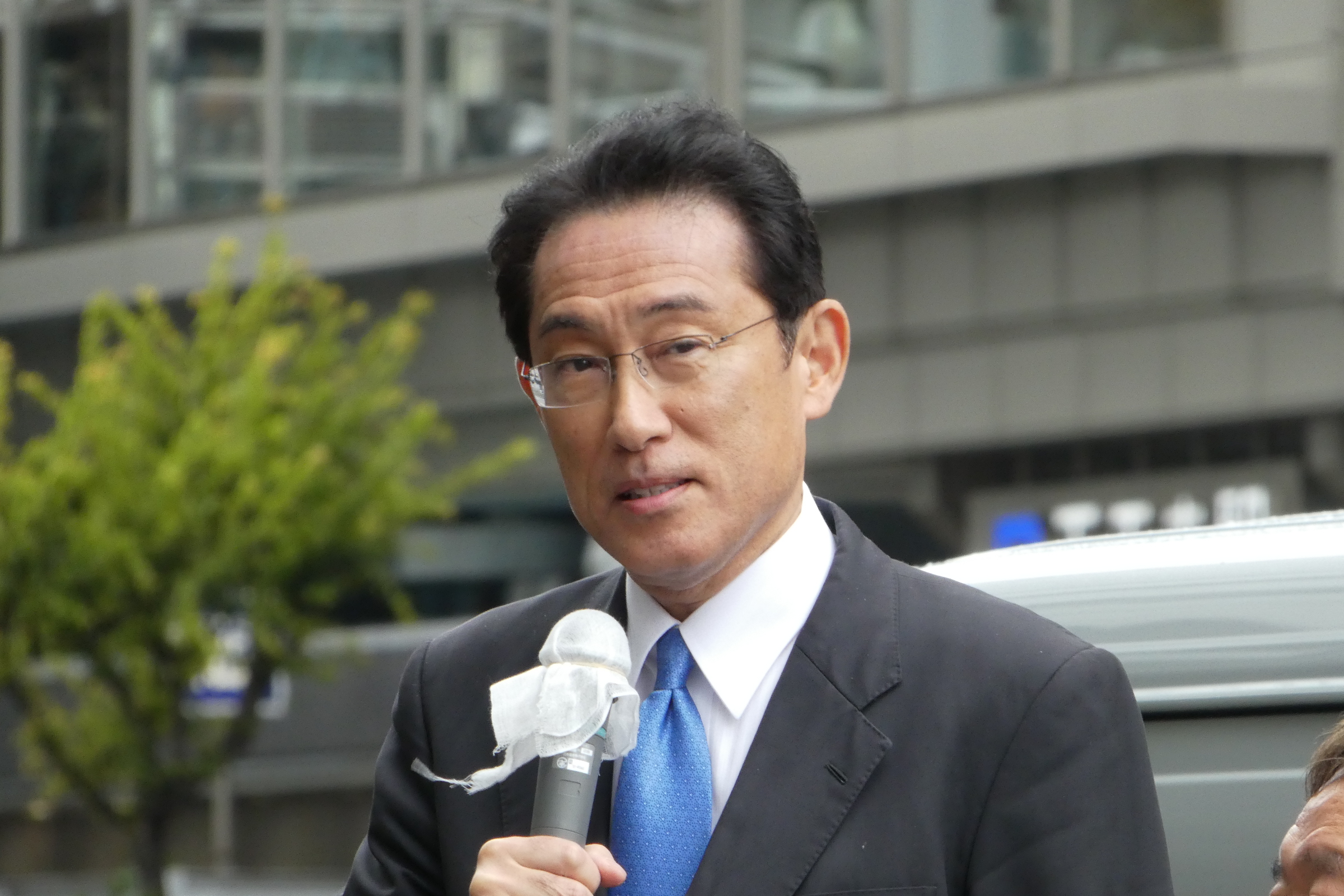
As a representative from Hiroshima, Kishida remained a staunch advocate for nuclear non-proliferation and disarmament within the framework of the Nuclear Non-Proliferation Treaty (NPT). However, his government continued to opt out of the Treaty on the Prohibition of Nuclear Weapons framework and discussions.
Kishida took a more assertive stance on regional security, stressing the need for stronger defenses against China and North Korea. He highlighted the ideological clash between authoritarianism and democracy in the region, particularly concerning the status of Taiwan. In 2017, as Foreign Minister, he pressured China to facilitate North Korea's denuclearization and supported a summit between Japan and North Korea to address the issue of Japanese abductees.
He pushed for increasing Japan's defense spending to 2% of GDP, aligning with NATO targets, a significant departure from previous policies. His administration also loosened military restrictions, allowing arms sales overseas and revising rules for equipment and technology transfer to more partners. Kishida, acknowledging the nation's severe security environment, initiated a U.S.-Japan joint operational command to ensure seamless military cooperation.
6.4. Social Issues
On social issues, Kishida often took a cautious or moderate stance, seeking broad public consensus before endorsing significant changes.
He supported discussions towards allowing married Japanese couples to choose between unified single surnames or separate last names, and was a founding member of a Diet group advocating for this. However, on the topic of same-sex marriage, Kishida stated he had not yet come to support it, emphasizing that public opinion should be thoroughly understood before the Diet makes a decision. In 2023, he reiterated his cautious stance, stating that allowing same-sex marriage "could affect the structure of family life in Japan" and that disallowing it was not "unjust discrimination" by the state. These comments drew criticism from opposition lawmakers and LGBTQ+ activists, who questioned his commitment to sexual diversity.
Regarding other gender-related issues, his 2022 cabinet reshuffle included only two female ministers out of 19, and his 2023 reshuffle of Vice-Ministers and Parliamentary Secretaries resulted in no female appointees. His comment about expecting women to demonstrate "sensibility and empathy unique to women" also drew criticism for perpetuating gender stereotypes.
6.5. Nuclear Policy
Kishida's stance on nuclear policy reflected a pragmatic approach to energy security while upholding Japan's commitment to non-proliferation. He advocated for the retention of nuclear power technology, viewing it as a clean energy option, and supported the restart of nuclear power plants that met the new safety standards set by the Nuclear Regulation Authority.
He also supported the nuclear fuel cycle, arguing that reprocessing spent nuclear fuel would reduce the disposal period for high-level waste to 300 years, compared to 100,000 years for direct disposal. However, critics pointed out that this relies on the development of currently non-existent "fast reactors" and their reprocessing facilities. As a representative from Hiroshima, Kishida consistently championed Japanese diplomacy aimed at promoting nuclear non-proliferation and disarmament within the framework of the Nuclear Non-Proliferation Treaty (NPT).
6.6. Other Policy Positions
Kishida held diverse policy views beyond core economic and foreign affairs. He advocated for the protection of freedom of expression in manga and anime, recognizing their role as Japan's "soft power." He also supported the introduction of an "income-contingent tuition repayment system" for higher education and acknowledged problems with the corporatization of national universities, advocating for public and private funding alongside deregulation of university operations.
He opposed the creation of female imperial households and the revision of the LDP's mandatory retirement age for Diet members. While leaders of the LDP traditionally leave their factions for impartiality, Kishida controversially continued to lead the Kōchikai faction even after becoming Prime Minister, a practice that drew some criticism but was defended by party officials.
Regarding the Moritomo Gakuen scandal, Kishida stated that further explanations were needed for the public but ruled out a re-investigation, a stance that drew criticism from some as an attempt to appease former Prime Minister Abe's allies.
7. Personal Life and Public Image
Fumio Kishida's personal life and public image have been integral to his political persona, revealing aspects of his character, interests, and how he is perceived by the Japanese public.
7.1. Family and Private Life
In 1988, Fumio Kishida married Yuko Kishida, the daughter of a Japanese real estate investor, in an arranged marriage, though it has been described as a "love at first sight" for Kishida. The couple has three sons, who grew up in Hiroshima. During his tenure as Prime Minister, his eldest son, Shōtarō Kishida, served as his policy secretary, until he was dismissed due to misconduct. While living in the parliamentary dormitory and later the Prime Minister's official residence, Kishida reportedly took on domestic chores such as washing dishes and cleaning the bath, challenging traditional gender roles. He has also humorously addressed rumors about ghosts inhabiting the Prime Minister's residence, stating he had not yet encountered any.

7.2. Hobbies and Interests
Kishida is a passionate fan of baseball, particularly the Hiroshima Toyo Carp team, a devotion he inherited from his father. A former high school baseball player himself, he views the Carp's spirit of perseverance as a metaphor for his own political convictions. He is a fan of former Carp player Sachio Kinugasa. He even threw a ceremonial first pitch at a Carp game in 2016 as a PR stunt for the G7 Foreign Ministers' meeting. In March 2023, he threw the first pitch at a World Baseball Classic game between Japan and South Korea, donning a jersey with "101" to represent his 101st premiership. He also maintains a friendship with Hajime Moriyasu, the coach of the Japan national football team, reflecting his interest in sports.
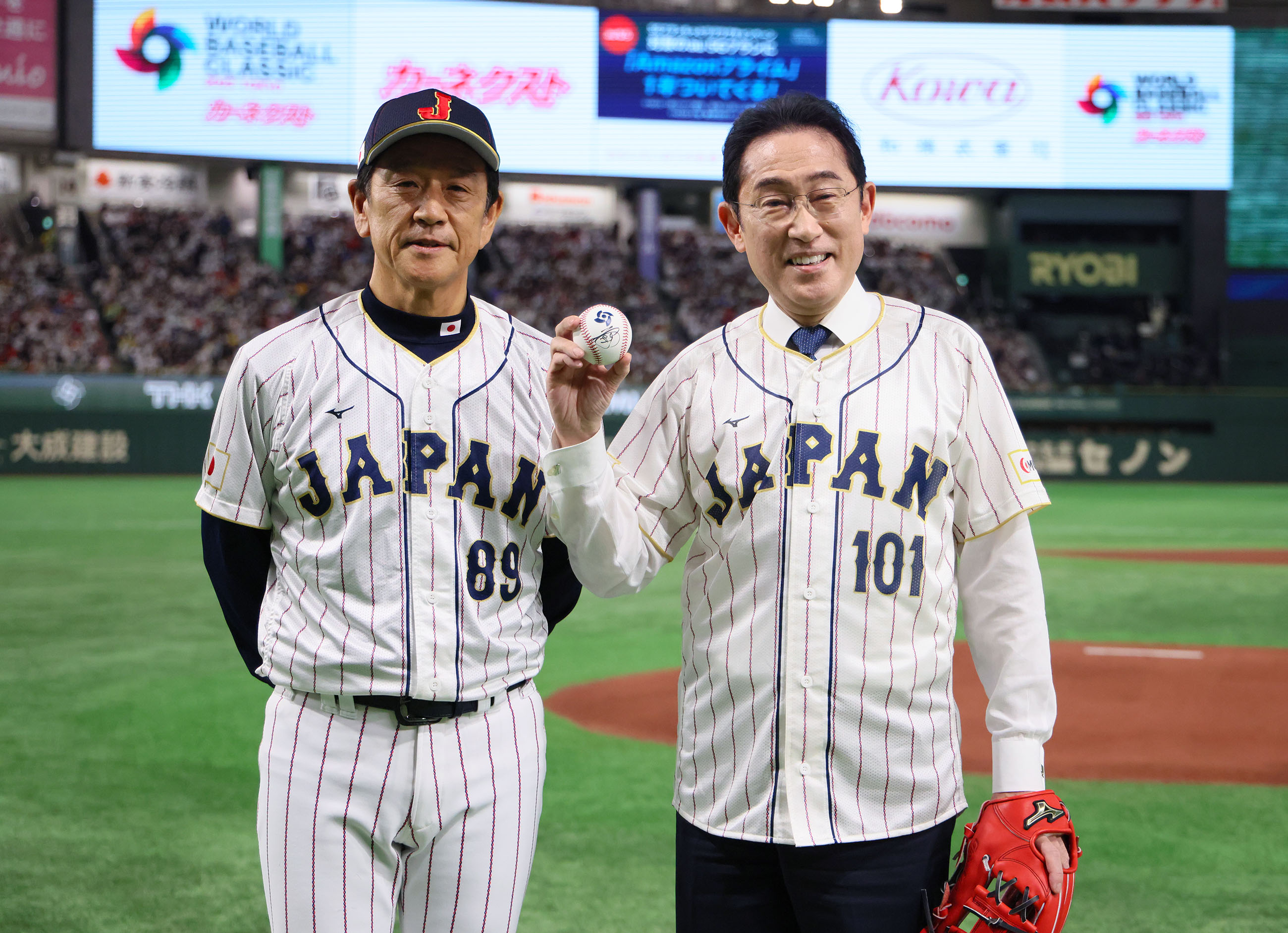
Beyond sports, Kishida has a keen interest in popular culture. He is a self-professed fan of Japanese manga and anime, notably having read all volumes of the popular series Demon Slayer: Kimetsu no Yaiba, with his favorite character being Akaza. He has pledged to financially support the Japanese animation industry during his premiership. He also enjoys reading Shippu no Hayato, a manga about Hayato Ikeda, the founder of his faction, whom he deeply respects, and Kōsaku Shima series. His musical tastes include Southern All Stars, with "Namida no Kiss" being his go-to karaoke song.
Kishida is known for his meticulous grooming, reportedly visiting the barber more than twice a month for cuts, gray hair dyeing, and even head massages and nail care. This attention to detail extends to his commitment to his routine, even visiting the barber on the day he returned to Tokyo after the April 2023 assassination attempt.
7.3. Public Image and Nicknames
Kishida's public image has evolved throughout his career. He is often characterized by his "listening ability" (聞く力kikukukaraJapanese), a trait he actively promotes, carrying a "Kishida Note" to record public opinions and criticisms. He regularly holds "Kurumaza Taiwa" (wheel-seat dialogues) where he directly engages with citizens.
He has embraced various nicknames, including "Kishishi," a friendly moniker used by his colleagues, and "Fumikyun." He is also referred to as "Kenshi" (検討士Japanese, man of deliberation), a sarcastic play on his frequent use of "I will consider it" in response to questions, particularly regarding economic policies.
However, his public image took a hit with the spread of derogatory nicknames such as "Tax-hike glasses" (増税メガネZōzei meganeJapanese) and "Tax-hike shitty glasses" (増税クソメガネZōzei kuso meganeJapanese) across social media, linking his trademark glasses to his administration's proposed tax increases. While "Tax-hike glasses" was a top contender for "New Words of the Year" in 2023, it was not officially recognized due to its derogatory nature. Despite this, the term "tax" became the Kanji of the Year 2023, partly attributed to this nickname. His image was further tarnished by the "Japan Destruction Shitty Glasses" nickname that trended after the "Ishiba Shock" following his resignation announcement. He also faced criticism, dubbed "#NoMaskKishida" on social media, for being seen unmasked during international meetings while Japanese citizens were still encouraged to wear masks.
In a positive light, Kishida was appointed Honorary Sommelier by the Japan Sommelier Association in February 2023, reflecting his reputation as a heavy drinker. The Singaporean government also honored him by naming a new orchid hybrid "Dendrobium Kishida Fumio" in June 2022, commemorating bilateral friendship.
Kishida is active on social media platforms, including X, Facebook, Instagram, YouTube, and LINE. During the 2021 LDP presidential election, he launched an online "Kishida Box" to solicit public opinions, which he then addressed on his social media. His engagement included Instagram live streams with his family, and he notably made headlines by revealing his favorite Demon Slayer character, Akaza, on X, prompting humorous responses from fans.
8. Honours and Awards
Fumio Kishida received several national and international honors and decorations throughout his career:
Knight Grand Cross of the Order of Orange-Nassau (Netherlands) Knight Grand Cross of the Order of Isabella the Catholic (Spain) 
Grand Cross of the National Order of Merit (Paraguay) 
First Class of the Order of Prince Yaroslav the Wise (Ukraine) Golden Pheasant Award (Boy Scouts of Japan)
8.1. List of Honors
- Knight Grand Cross of the Order of Orange-Nassau (October 29, 2014)
- Knight Grand Cross of the Order of Isabella the Catholic (March 31, 2017)
- Grand Cross of the National Order of Merit (May 3, 2024)
- First Class of the Order of Prince Yaroslav the Wise (August 23, 2024)
- Golden Pheasant Award (Boy Scouts of Japan) (November 26, 2022)
9. Resignation
The conclusion of Fumio Kishida's premiership was marked by his decision not to seek re-election as the leader of the Liberal Democratic Party. On August 14, 2024, Kishida publicly announced that he would not contest the 2024 Liberal Democratic Party (Japan) presidential election scheduled for September.
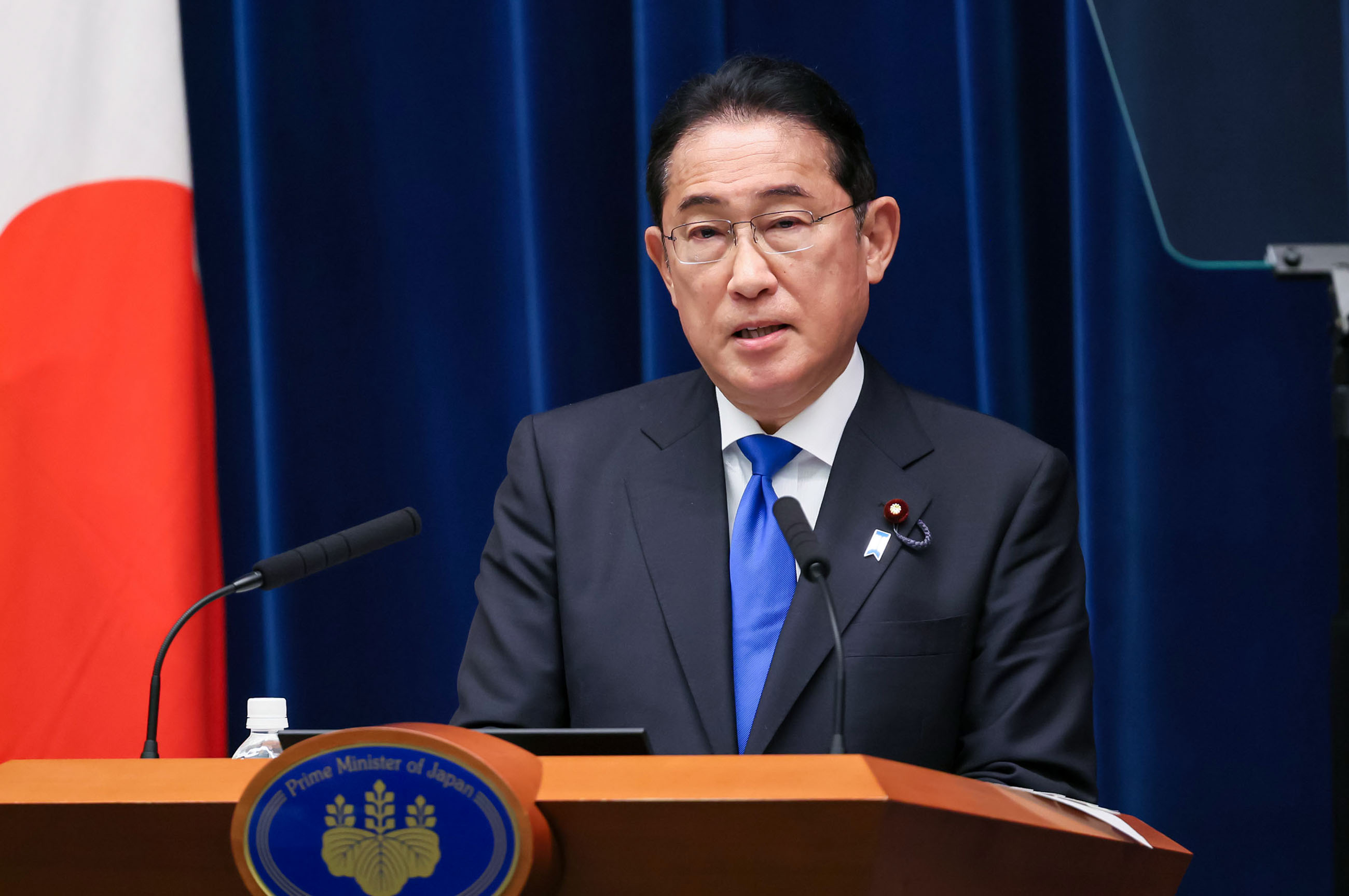
His decision was primarily attributed to his administration's struggle to recover from record-low approval ratings, largely due to the fallout from the LDP slush fund scandal and persistent public distrust. Kishida stated that his withdrawal was necessary for the party to have an "open contest to promote debate" and "to show the people that the LDP is changing," implying that his continued leadership might hinder the party's reform efforts.
In the subsequent LDP leadership election, Kishida initially endorsed his Chief Cabinet Secretary, Yoshimasa Hayashi. However, in the second round of voting, he reportedly rallied votes for Shigeru Ishiba, who ultimately defeated Sanae Takaichi to become the next party leader and prime minister.
Kishida formally resigned as Prime Minister when the new LDP leader was elected, with his tenure officially ending on October 1, 2024. He served for 1,094 days, making his premiership the eighth longest in post-war Japanese history. Despite stepping down from the top leadership role, Kishida successfully secured his 11th term as a member of the House of Representatives in the 2024 Japanese general election on October 27.
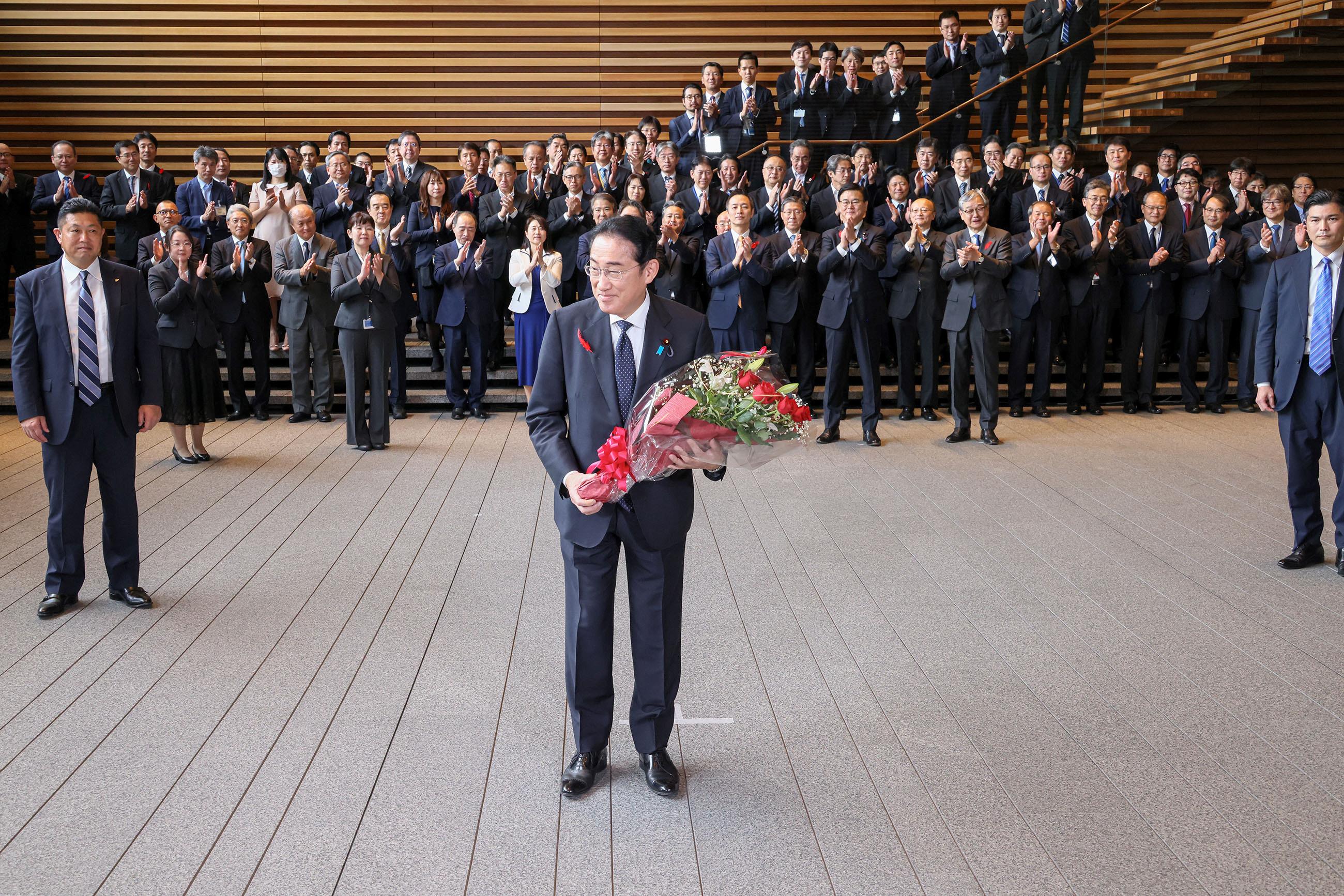
10. External Links
- [https://kishida.gr.jp/ Official Website]
- [https://japan.kantei.go.jp/101_kishida/meibo/daijin/kishida_e.html Government Website]
- [https://twitter.com/kishida230 X (formerly Twitter)]
- [https://www.instagram.com/fumio_kishida/ Instagram]
- [https://www.youtube.com/channel/UCuuVLJljOCZqCie0k0Z6aRg YouTube]
- [https://www.facebook.com/kishdafumio/ Facebook]
- [https://line.me/ti/p/40956cxlqh LINE]


